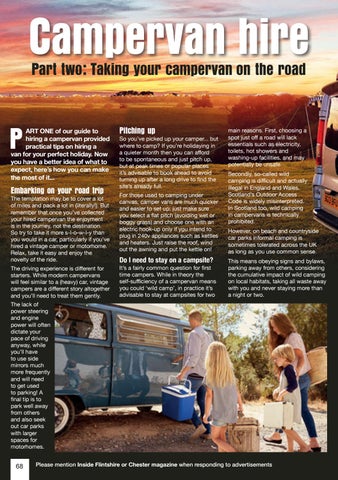Campervan hire Part two: Taking your campervan on the road
P
ART ONE of our guide to hiring a campervan provided practical tips on hiring a van for your perfect holiday. Now you have a better idea of what to expect, here’s how you can make the most of it...
Embarking on your road trip
The temptation may be to cover a lot of miles and pack a lot in (literally!). But remember that once you’ve collected your hired campervan the enjoyment is in the journey, not the destination. So try to take it more s-l-o-w-l-y than you would in a car, particularly if you’ve hired a vintage camper or motorhome. Relax, take it easy and enjoy the novelty of the ride. The driving experience is different for starters. While modern campervans will feel similar to a (heavy) car, vintage campers are a different story altogether and you’ll need to treat them gently.
Pitching up
So you’ve picked up your camper... but where to camp? If you’re holidaying in a quieter month then you can afford to be spontaneous and just pitch up, but at peak times or popular places it’s advisable to book ahead to avoid turning up after a long drive to find the site’s already full. For those used to camping under canvas, camper vans are much quicker and easier to set up: just make sure you select a flat pitch (avoiding wet or boggy grass) and choose one with an electric hook-up only if you intend to plug in 240v appliances such as kettles and heaters. Just raise the roof, wind out the awning and put the kettle on!
Do I need to stay on a campsite?
It’s a fairly common question for first time campers. While in theory the self-sufficiency of a campervan means you could ‘wild camp’, in practice it’s advisable to stay at campsites for two
main reasons. First, choosing a spot just off a road will lack essentials such as electricity, toilets, hot showers and washing-up facilities, and may potentially be unsafe. Secondly, so-called wild camping is difficult and actually illegal in England and Wales. Scotland’s Outdoor Access Code is widely misinterpreted. In Scotland too, wild camping in campervans is technically prohibited. However, on beach and countryside car parks informal camping is sometimes tolerated across the UK as long as you use common sense. This means obeying signs and bylaws, parking away from others, considering the cumulative impact of wild camping on local habitats, taking all waste away with you and never staying more than a night or two.
The lack of power steering and engine power will often dictate your pace of driving anyway, while you’ll have to use side mirrors much more frequently and will need to get used to parking! A final tip is to park well away from others and also seek out car parks with larger spaces for motorhomes.
68
Please mention Inside Flintshire or Chester magazine when responding to advertisements






